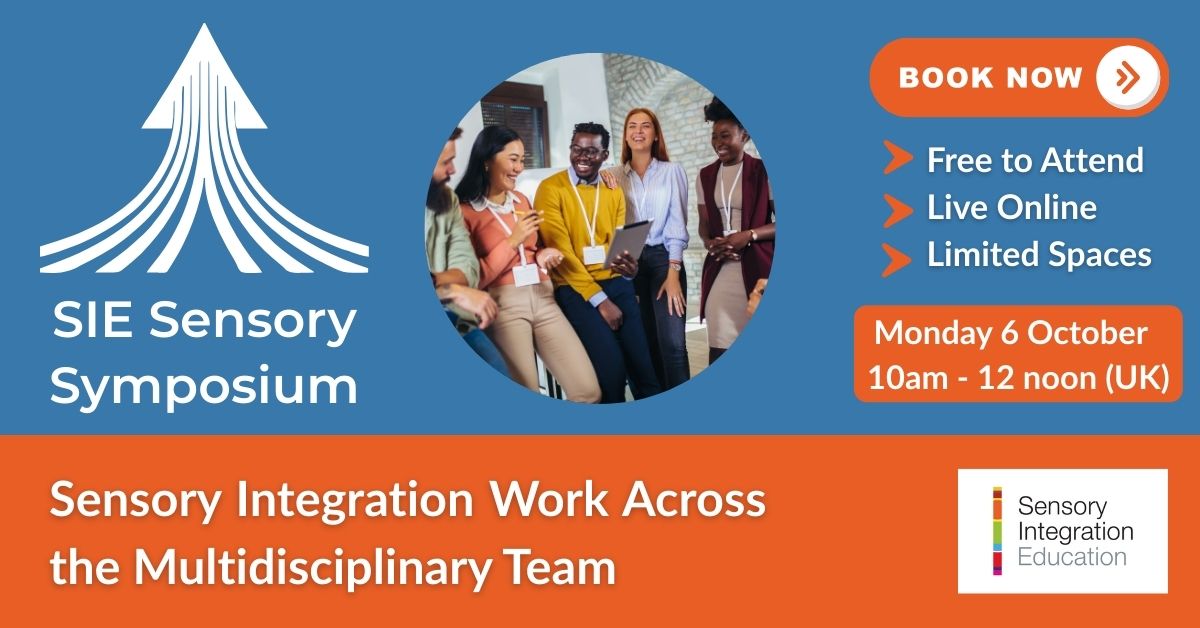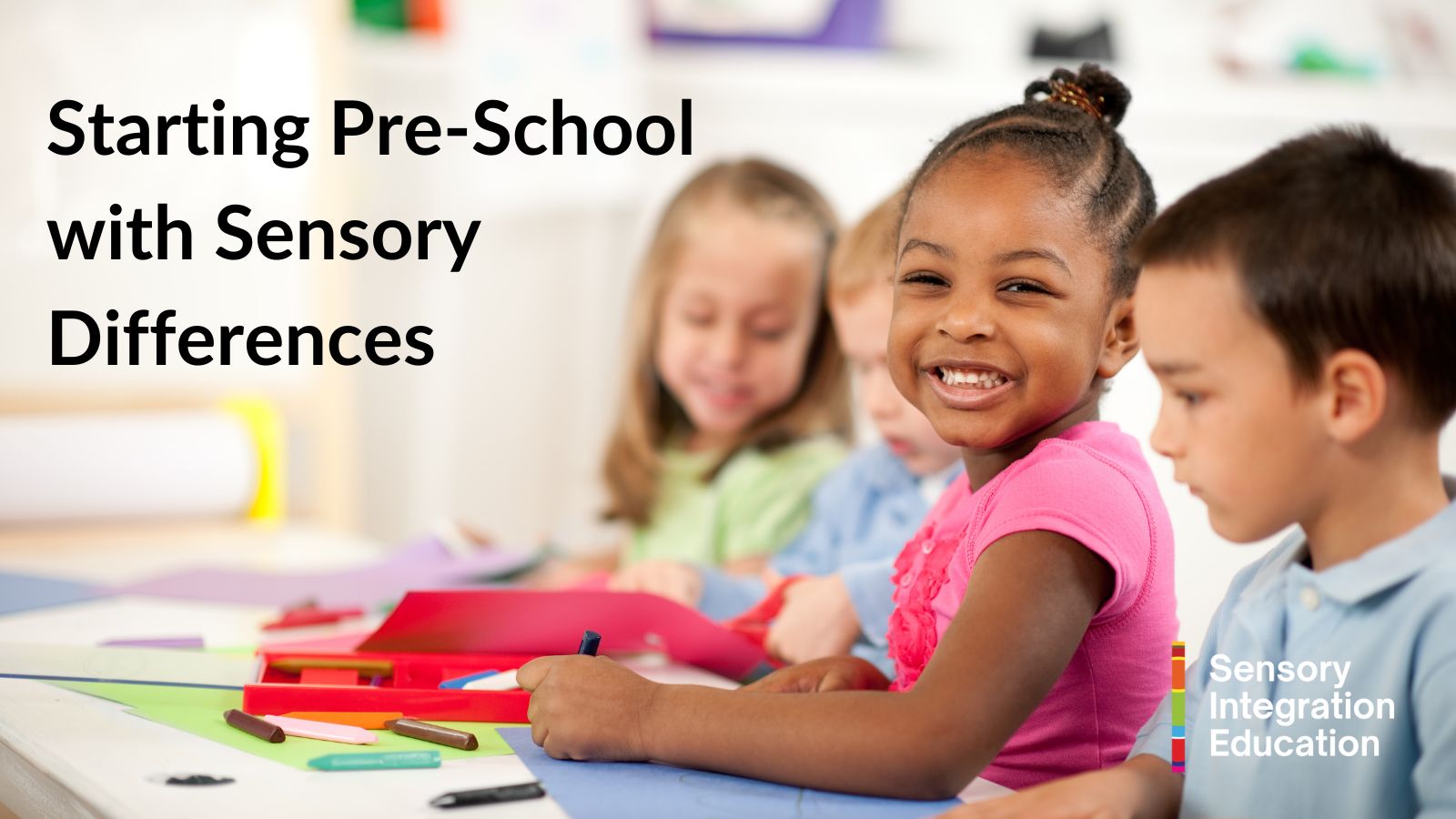EmphaSIze September 2025: Transitions and Routines
By Sensory Integration Education, 2 September 2025
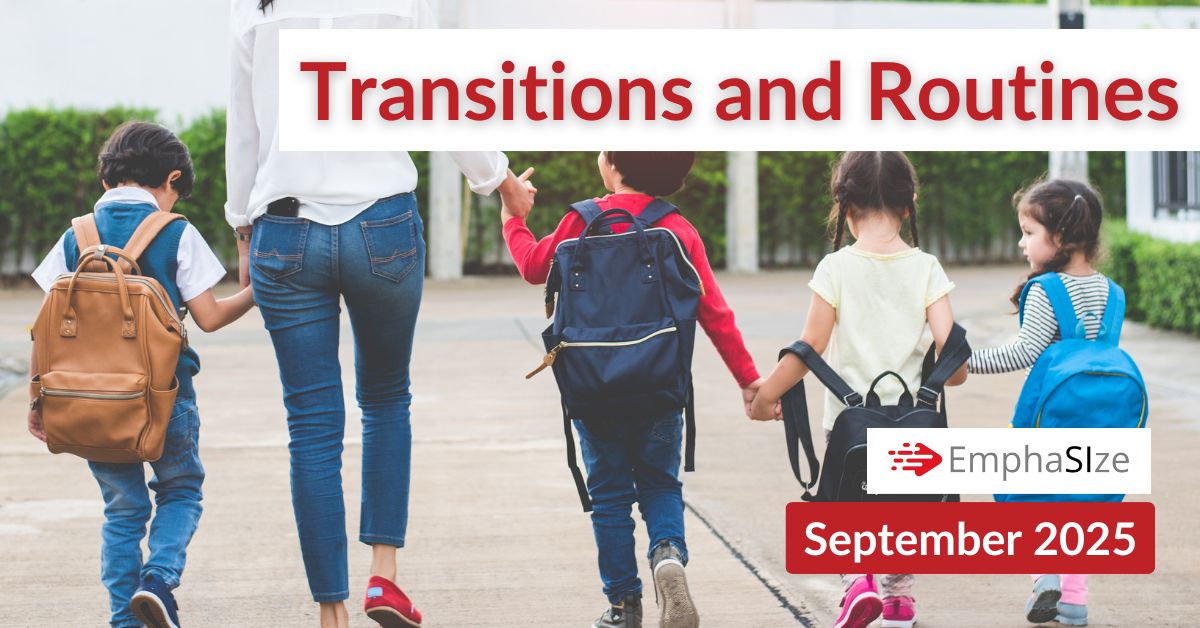
Welcome to the September issue of EmphaSIze! This month we're focusing on Transitions and Routines.
With the new academic year already in place for most of us, this can be an exciting time for children and teens. However, for those with sensory processing issues, transitioning to a new school, college or university or starting back after a long summer break and adjusting to a new routine can bring a number of challenges that make it difficult for these individuals to succeed in a school or college setting.
In this month's EmphaSIze, we've put together useful information, research, articles, books, and product ideas to help better inform ourselves of how we can support these individuals navigate these transitions and changes in routines.
News & Features
Grab Your Free Copy of Our Back to School Sensory Survival Kit
After a long summer break, going back to school can be difficult. For children and young people with sensory differences, it can be even harder with so many aspects to consider regardless of whether they are starting school for the first time or starting a new school year.
Packed with helpful tips and useful product suggestions, our Back to School Sensory Survival Kit is a FREE guide to help families prepare for a smoother start to a new school year.
Download your free copy here and please share with the families you’re working with.
It's Time to Move Sensory Integration Off the Sidelines - Join the Conversation and Book Your Free Place at Next Month's SIE Sensory Symposium
Have you booked your place yet for next month’s SIE Sensory Symposium? This is a free 2-hour online session chaired by SLT and Advanced SI Practitioner, Amy Stephens where we’ll be looking at the role of sensory integration (SI) work across multi-disciplinary teams (MDTs).
Currently we recognise there is a lack of clarity about how the effective use of SI aligns with the roles and responsibilities of different professions. One of the key aims of this event will be to bring together the thinking from different disciplines as the first stage of creating the standards of practice for sensory integration work across the MDT.
On the day, Amy will be joined by an invited panel of professionals who will share their perspectives on what a SI lens brings to their own specific area of work:-
- Karen Forrest, OT & Advanced SI Practitioner
- Carolina Read, Physiotherapist & SI Practitioner
- Mary Sheehan, SLT & Advanced SI Practitioner
- Jordan Garratt , Special Education Teacher
- Katie Lydiatt, Educational Psychologist
Places are limited – so book your spot now!
Free Guide: Sensory-Based Behaviour in the Classroom
If you work in a school setting, this Sensory Inclusive Schools resource is worth a look!
This free guide introduces you to sensory processing, explains what sensory-based behaviour looks like in the classroom, and offers actionable, easy strategies to help you support students with sensory processing differences and make your school more sensory inclusive.
Download a copy of the guide here and please share with your colleagues!
Starting Pre-School with Sensory Differences
Starting pre-school is an exciting milestone, but for children with sensory processing differences it can also bring unique challenges. The busy, structured environment of nursery—filled with new routines, group activities, and a wide range of sensory experiences—can sometimes overwhelm children who are sensitive to sights, sounds, or touch, or who find motor coordination more difficult.
This blog explores the common sensory and motor coordination challenges that can arise at this stage, and offers practical suggestions for parents and staff to support children in building confidence and enjoying a positive start to their educational journey.
Meet Peter - A University Student with Sensory Processing Differences
Taken from our A Day in the Life Of…series of sensory stories, this particular example focuses on Peter – an 18-year-old university student who experiences differences in sensory processing and integration. He’s a quiet young man who tends to keep to himself. Having just started university and moved into halls of residence, Peter is adjusting to a wave of new experiences and unfamiliar environments—which can feel overwhelming. Because of his sensory processing differences, his behaviour is sometimes misunderstood by others.
To better understand how sensory processing and integration differences can affect young adults like Peter who are embarking on a new life at university, we take a look at a typical day for Peter, highlighting areas where he may need support and adaptations to routines and environments.
Also see:
‘Fixing’ neurodivergent kids misses the point — it’s the schools that need to change
The rulebook I never got: A neurodivergent teacher’s journey from masking to belonging
Why Autistic, ADHD, and AuDHD Students Are Stressed at School
SEND community asked to help shape UK’s first mobile sensory public library
Developing a Sensory Design Tool for Everyday Environments
The impact of having ADHD and Autism
Resources
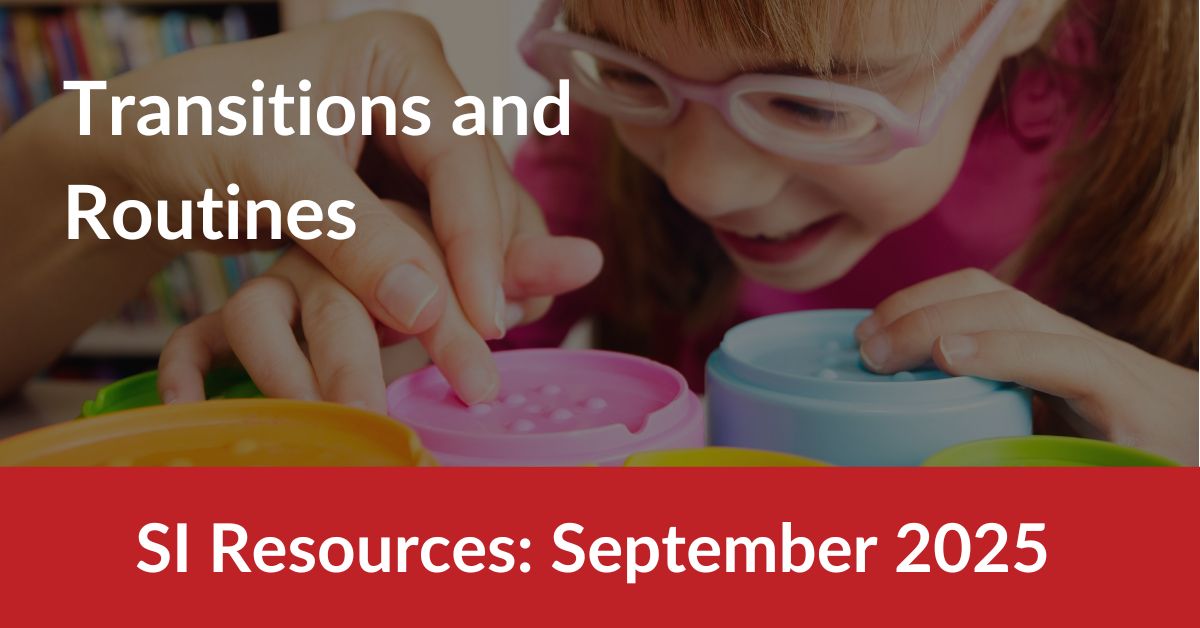
Take a look at our books and product recommendations for this month:
Oli’s Sensory Safari: This is a compelling and educational read for anyone interested in gaining an insight into sensory processing and autism, providing a gentle introduction to these topics. Inspired by the author's personal experiences with her son, the book is a heartwarming exploration of life through the eyes of Oli, a young boy with autism, as he embarks on a sensory safari field trip with his classmates. It's a story that invites young readers to step into Oli's shoes, offering a unique perspective on how he perceives and interacts with the world.
Suzie & Sammy go to Bristol City FC: Local author Charlotte Olson and illustrator Nick Roberts have collaborated with Bristol City Robins Foundation to produce a Bristol City themed storyboard book for children with autism and sensory needs. The book tells the story of characters Suzie, Sammy and their dad on a trip to Ashton Gate for a Bristol City match.
By detailing exactly what to expect from an experience, young people with autism and sensory needs can be put more at ease and feel able to attend opportunities such as live football where otherwise it may have been overwhelming. The book was funded by the Premier League Fans Fund, as part of the Robins Foundation’s ‘We are City’ project. The Robins Foundation is also donating copies of the book for free to primary schools, SEN schools, libraries and day centres across South and Central Bristol.
All About Autism: A Practical Guide for Secondary Teachers: This is an accessible and informative guide for secondary school teachers, designed to increase their knowledge and understanding of autism and enhance their toolkit with practical, adaptable strategies to support autistic learners in their care.
The book initially explores key traits and terminology, debunks myths and misconceptions, and shines a light on the strengths and abilities of autistic learners. It then introduces readers to a range of easy-to-implement ideas for practice and concrete solutions to provide further support, all with the child at the heart. It’s a useful read for all secondary school educators, SENCOs and parents who are supporting autistic learners aged 11-16.
LoveHugs Musical Star Teddy Sensory Light: This star cushion has been designed to help children of all ages including children with autism, ADHD, special needs or sleep issues. The product’s soft colour changing lights, cuddly exterior and calming “Twinkle, Twinkle Little Star” music helps to soothe and calm children. The cushion can be used as a night light, a cuddle toy or can also be hanged from the ceiling or door.
Textured Sensory Mats: These mats come in different colours and textures to help meet children's sensory development needs. Each sensory floor tile is backed with a non-slip design, each with an edging design to keep children safe while playing. By playing with the different textured mats, children can improve their hand eye coordination, dexterity, and motor skills in a fun and interactive way. By stimulating children's sensory nerves, these mats will also help to calm them and relax.
SI Research Digest
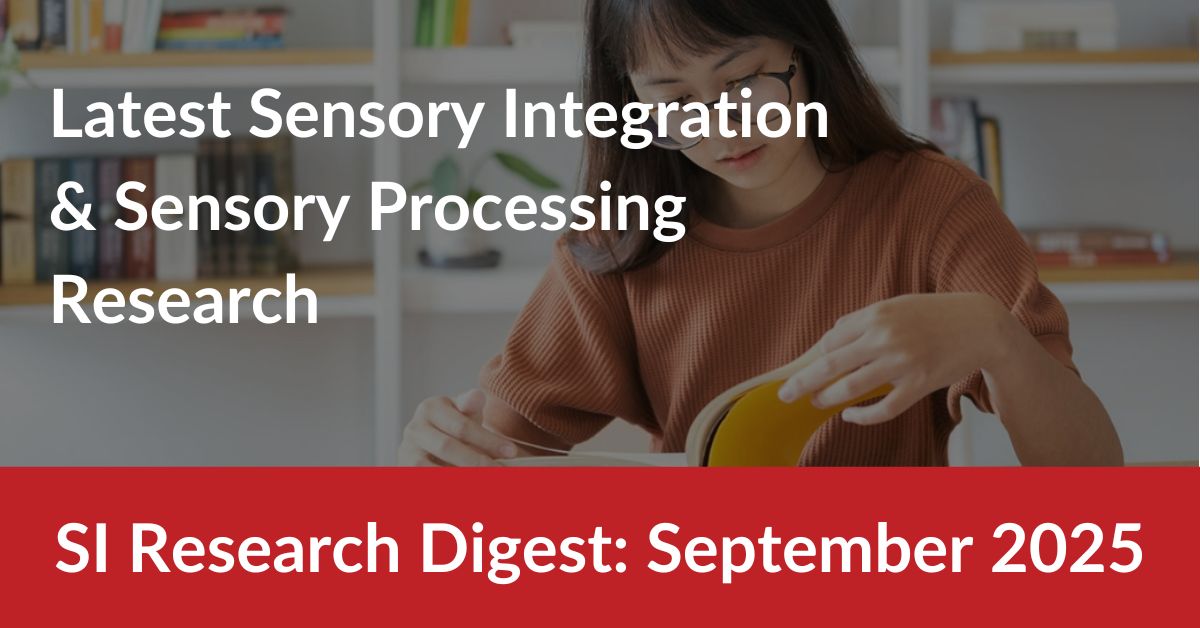
Below are links to the most popular sensory integration and sensory processing research papers and findings published on our social channels last month:
Co-occurrence of ADHD and Motor Problems in Children: The Impact on Quality of Life
This new study investigated the co-occurrence of DCD and ADHD on the impact of the quality of life of young people. The researchers found that those with co-occurring ADHD and DCD often presented with lower quality of life than children with either ADHD or DCD and highlight the need for support to address these difficulties.
This new study investigated the impact of sensory processing differences on children's motor skills and physical fitness levels. The researchers found that children whose sensory differences impacted on their motor coordination presented with lower levels of speed and agility compared to peers without these difficulties, influencing participation in sporting and leisure activities.
This new systematic review investigated language difficulties in children with developmental coordination disorder (DCD), and motor difficulties in children with developmental language disorder (DLD). The researchers found evidence to suggest that many children with DCD present with communication and phonological problems. Consistence evidence was found for general motor problems in children with DLD, particularly in the areas of balance, locomotor, and fine motor skills.
Caregiver Coaching: Promoting Co-regulation with Toddlers in Early Intervention
This new study investigated the effect of parent coaching on promoting co-regulation between toddlers and their parents. The researchers found that caregiver participants demonstrated increased knowledge in several different topics, including co-regulation/dysregulation, sensory strategies for co-regulation, and the importance of self-regulation for caregivers following the coaching programme. Participants also learned to implement specific intervention strategies to foster co-regulation and improve child occupational engagement and indicated that parent coaching was a valuable intervention.
Inclusive Dining: Insights from Families of Children with Autism Spectrum Disorder
This new qualitative study investigated the obstacles faced by families with autistic children when dining out and discusses suggestions for service strategies that restaurants can implement to serve them better. Barriers identified included a lack of awareness from staff and environments that did not meet the sensory needs of the child.
Upcoming Courses and Webinars
We have a number of live webinars that take place throughout the year covering a broad range of SI-related topics. Below is a snapshot of webinars happening over the next few months or click here to view a summary of all the upcoming live events.
All these webinars are available to you by signing up to our Lifelong Learning Programme or can be purchased as individual courses:
ØIntroduction to MYSET© - My Sensory Experiences Tool – 9 September 2025
ØSensoRSE- A Sensory Approach to Relationships and Sex Education – 15 September 2025
Ø(Sensory Spotlight Talk) Sensory Processing and Sleep in Autism with Dr Shelly Lane – 19 September 2025
Ø Introduction to Sensory Integration and Yoga - 13 October 2025
Ø Using the Adult/Adolescent Sensory History (ASH) In Clinical Practice – 20 October 2025
Ø Rethinking Mental Health Through Sensory Formulation – 22 October 2025
Latest Job Listings
 Are you thinking of making a career move this year? Check out our latest job listing:
Are you thinking of making a career move this year? Check out our latest job listing:
Contractors – Paediatric Occupational Therapists with Sensory Integration Training, Parents And Children Together (PACT), Berkshire and surrounding areas, UK
Discounts & Special Offers
Please quote DISCOUNT CODE SIE20 for 10% discount on Southpaw orders up to £100. Orders must be placed by phone on +44 (0) 115 718 0020.
Would you like to receive EmphaSIze: The Sensory Integration Newsletter in your inbox? JOIN SIE FREE TODAY
Best wishes,
Sensory Integration Education
NB: Sensory Integration Education is not responsible for the content on external websites. Sharing a resource does not imply endorsement by Sensory Integration Education.



